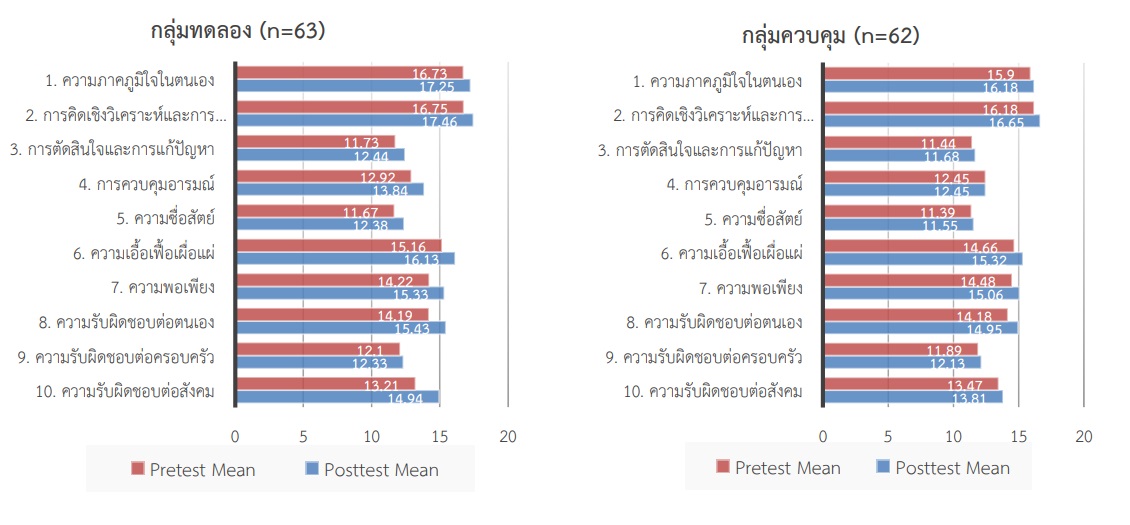ผลของโปรแกรมสร้างเสริมทักษะชีวิตโดยใช้สื่อภาพยนตร์การ์ตูนแอนิเมชัน ต่อทักษะชีวิตในเด็กด้อยโอกาส ภาคเหนือของประเทศไทย
คำสำคัญ:
โปรแกรมสร้างเสริมทักษะชีวิต, การ์ตูนแอนิเมชัน, เด็กด้อยโอกาส, ภาคเหนือของประเทศไทยบทคัดย่อ
การวิจัยกึ่งทดลองแบบสองกลุ่มวัดผลก่อนหลังนี้ มีวัตถุประสงค์เพื่อศึกษาผลของโปรแกรมสร้างเสริมทักษะชีวิตโดยใช้สื่อภาพยนตร์การ์ตูนแอนิเมชัน 3 มิติต่อทักษะชีวิตในเด็กด้อยโอกาส อายุ 9-12 ปี จากโรงเรียนศึกษาสงเคราะห์/ราชประชานุเคราะห์ ภาคเหนือของประเทศไทย ดำเนินการตามกรอบทฤษฎีพฤติกรรมตามแบบแผนของเอจเซน ร่วมกับสื่อภาพยนตร์การ์ตูนแอนิเมชันและภาพนิ่งประกอบการบรรยาย เนื้อหาโปรแกรมครอบคลุม 10 ทักษะ ประกอบด้วย 1) ความภาคภูมิใจในตนเอง 2) การคิดเชิงวิเคราะห์และการบริโภคสื่อ 3) การตัดสินใจและการแก้ปัญหา 4) การควบคุมอารมณ์ 5) ความซื่อสัตย์ 6) ความเอื้อเฟื้อเผื่อแผ่ 7) ความพอเพียง 8) ความรับผิดชอบต่อตนเอง 9) ความรับผิดชอบต่อครอบครัว และ 10) ความรับผิดชอบต่อสังคม คัดเลือกกลุ่มตัวอย่างโดยใช้วิธีการสุ่มหลายขั้นตอน กลุ่มตัวอย่างแบ่งเป็น 2 กลุ่มได้แก่ กลุ่มทดลอง คือกลุ่มที่ได้เข้าร่วมโปรแกรมสร้างเสริมทักษะชีวิตโดยใช้สื่อภาพยนตร์การ์ตูนแอนิเมชัน 3 มิติ จำนวน 72 คน และกลุ่มควบคุม คือกลุ่มที่ได้รับการเรียนการสอนตามปกติจำนวน 72 คน การเก็บรวบรวมข้อมูลใช้แบบสอบถามข้อมูลทั่วไป และแบบวัดทักษะชีวิตสำหรับนักเรียนชั้นประถมศึกษา ตรวจสอบคุณภาพเครื่องมือโดยใช้สัมประสิทธิ์แอลฟ่าครอนบาคได้เท่ากับ .87 วิเคราะห์ข้อมูลโดยใช้สถิติบรรยาย สถิติการทดสอบไคสแควร์และสถิติการทดสอบค่าที
ผลการศึกษาพบว่า กลุ่มทดลองที่ได้รับโปรแกรมสร้างเสริมทักษะชีวิตโดยใช้สื่อภาพยนตร์การ์ตูนแอนิเมชัน 3 มิติ มีค่าเฉลี่ยคะแนนทักษะชีวิตสูงกว่าก่อนเข้าร่วมโปรแกรมอย่างมีนัยสำคัญทางสถิติที่ระดับ .05 และมีค่าเฉลี่ยคะแนนเพิ่มขึ้นมากกว่ากลุ่มควบคุมอย่างมีนัยสำคัญทางสถิติที่ระดับ .05
ข้อเสนอแนะ ใช้โปรแกรมสร้างเสริมทักษะชีวิตนี้แก่เด็กด้อยโอกาสร่วมกับการสอนตามปกติได้
เอกสารอ้างอิง
Ajzen, I. (1991). The Theory of Planned Behavior. Organizational Behavior and Human Decision Processes, 50(2), 179-211.
Akfırat, O. N. & Kezer, F. (2016). A Program Implementation for the Development of Life Skills of Primary School 4th Grade Students. Journal of Education and Practice, 7(35), 9-16.
Chiangkul, W. (2009). “The Problem of Equality and Quality of Thai Education” State of Thai Education 2550/2551. Bangkok: V.T.C.Communication. (in Thai).
JungLee, M., ChiWu, W., ChiehChang, H., JungChen, H., ShanLin, W., YenFeng, J., et al. (2020). Effectiveness of a School-Based Life Skills Program on Emotional Regulation and Depression among Elementary School Students: A Randomized Study. Children and Youth Services Review, 118(2020), 105-464.
Kaewpatima, T. (2004). Development of a Life Skills Scale for Prathomsuksa 4-6 Students. Thesis in Educational Research and Evaluation, Kasetsart University. (in Thai).
Khamaikawin, P. (2014). Proposed Educational Strategies to Develop Essential Life Skills in Social Inclusion Promotion for Underprivileged Children. Degree of Doctor of Philosophy Program in Development Education Department of Educational Policy, Management, and Leadership, Chulalongkorn University. (in Thai).
Kummabutr, J. (2012). Effect of A Parent Training Program in Conjunction with a Life Skills Training Program on The Life Skills of School-Age Children. Doctor of Philosophy Nursing, Mahidol University. (in Thai).
Leksak, A. (2014). The Effects of Life Skills Development Program Using 3D Cartoon Animations on the Life Skills of Third Grade Students. Master of Nursing Science in Pediatric Nursing, Mahidol University. (in Thai).
National Statistical Office. (2018). Analysis of Children and Youth 2560. Bangkok: Text and Journal Publication. (in Thai).
Panmuang, C., Kraisakul, K., & Samakkee, P. (2014). Development of a Guidance Activities Packages Based on Multimedia for Life Skills Development of Rajchaprachanukhroh 19 School Mattayomsuksa 1 Students. Narkbhutparitat Journal Nakhon Si Thammarat Rajabhat, 6(2), 14-25. (in Thai).
Phuphaibul, R. (2006). The Theory of Planned Behavior: Related Research on Adolescents Behaviors. Ramathibodi Nursing Journal, 10(1), 24-33. (in Thai).
Phuphaibul, R., Kerddonfeg, P., Areeyanuchitkul, S., & Chantarachote, J. (2014). Comparison of the Effects of Life Skills Training Programs Using Cartoon Books and Using Animation Movies on Life Skills of School-Agers. Ramathibodi Nursing Journal, 20(2), 271-287. (in Thai).
Phuphaibul, R., Tachudhong, A., Areeyanuchitkul, S., Kongsaktrakul, C., Kerddonfeg, P., & Prasitchai, J. (2010). Documents for the Workshop on the Development of Life Skills and Health Skills of Elementary School Students and Family Participation. The Development Potentials of Thai People Project. Retrieved March 25, 2019 from https://www.rama.mahidol.ac.th/sdmc/th/ thaipopulation/AnnualThaiPopulation-th/. (in Thai).
Sondee, S. (2013). The Effects of Teaching Life Skill Program Using Animation Cartoon on Life Skills and Emotional Quotient among the Fifth-Grade Students. Master of Nursing Science in Pediatric Nursing, Mahidol University. (in Thai).
Special Education Bureau. (2016) Techniques for Cultivating Morals, Ethics, and Life Skills for Sueksa Songkhro. Bangkok: Special Education Bureau. (in Thai).
Sripakho, P. (2012). The Effects of The Life Skills Development Program Using Cartoon Books Media on Life Skills Among Grade Five Students. Master of Nursing Science in Pediatric Nursing, Mahidol University. (in Thai).
UNICEF. (2018). Situation analysis Teenage pregnancy in Thailand. Retrieved June 16, 2018 from www.unicef.org/thailand/media/1131/file/.pdf.

ดาวน์โหลด
เผยแพร่แล้ว
ฉบับ
ประเภทบทความ
สัญญาอนุญาต
ลิขสิทธิ์ (c) 2022 วารสารการพยาบาลและการศึกษา

อนุญาตภายใต้เงื่อนไข Creative Commons Attribution-NonCommercial-NoDerivatives 4.0 International License.





